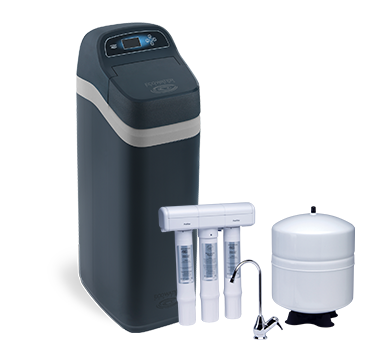With more than 30 years’ experience in the residential and commercial water treatment space, Mark Nelson is a Class 1 Drinking-Water Operator and a CBWA (Canadian Bottled Water Association) Certified Plant Operator. As founder and president of Nelson Water in Ottawa, Mark focuses on dealing with challenging water treatment system designs for problem water. He also heads the largest water bottling plant in the city of Ottawa with a delivery network throughout the Valley.
While you may think about the taste of your drinking water, many people don’t consider the overall water quality in their home. Unfortunately, poor quality water can not only impact your drinking experience, but it can also affect your appliances, bathing, and cooking. A whole house system can act as a firewall, protecting everything inside your home, preventing debris from accumulating inside your plumbing, water heater and other water using appliances. If you still need further convincing, here are three reasons to give a whole house water filter system some serious thought.
Creating an Additional Layer of Protection
Plumbing fixtures, appliances, and even a water softener all contain plastic or rubber seals. These seals are needed to prevent water escaping into your home. Unfortunately, even small amounts of debris or sediment can cause damage to these seals.
A damaged seal will leak, regardless of whether it is in your dishwasher, water heater, water softener or faucet. A whole house filter will remove this potentially damaging dirt, debris, and sediment, providing peace of mind that your appliances and plumbing is protected. Removing this debris will also reduce the strain on your appliances, prolonging their lifespan and promoting efficiency.
Eliminating Nasty Water Surprises
Whether your home is supplied by city or well water, there will be occasions when there is an unexpected shock in the system. This can lead to a nasty surprise from your taps. These “surprises can occur due to water main breaks, new water connection constructions or hydrant flushing. When these types of situations occur, it knocks any iron or sediment that has built up inside the pipes to loosen and be flushed into the water supply. This results in sludge of dirt or colored water coming into your home.
Water supplies can also vary season to season. A whole house filter provides the confidence to wash your white laundry anytime, without worrying about stains caused by poor water quality.
Simplicity
A whole house water filter doesn’t require electricity, and there is no water waste or salt needed. You don’t need to worry about setting a clock, changing batteries or programming a controller. These types of system can be added to any type of water treatment system at any time.
The only maintenance required for whole house water filters is periodically changing the filters. Typically, the filters only require changing every 12 to 36 months, depending on your water usage, water quality and the filter rating.
Choosing a Whole House Filter
If you are thinking about a whole house filter, there are a few factors to consider. You’ll need to assess the physical filter size, the Micron rating of the filter, the filter lifespan and the flow rating.
Larger filters have a greater surface area, so they offer better water pressure and last longer. Smaller filters tend to load up fast and struggle to handle more than one appliance running. While a 2”x10” filter may be a great option as a drinking water filter, they are simply too small for a whole house application.
For installation on whole house water filter, you should consider contacting a certified water treatment professional.

